Easy and engaging AI learning is easier than you think.
With hands-on micro:bit-based projects, students
learn step-by-step how AI works.
They can train their own models, connect them to robotics projects, and use their creativity to make real change in the world.

Educators who give Forward Education's hands-on STEAM tools high marks

Teachers who agree micro:bit makes Computer Science more enjoyable for students

Students who found the micro:bit enjoyable and useful for solving problems

"The blend of physical components and engaging lessons empowers students to be innovative and take action in solving local and global issues."
Tonya Coats
Project Specialist for Digital Learning

"It’s rewarding to see the popcorn kernels popping in their heads with ideas and then realizing, this is cool stuff and we could really change the world."
Ryan Hong
7th Grade Teacher
AI Learning Resources
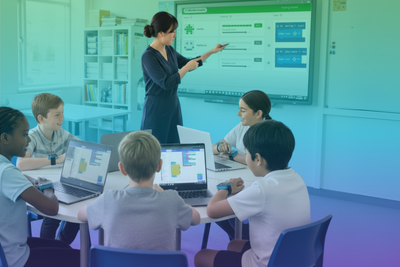
AI Tutorials and Projects
Hands-on micro:bit AI teaching resources to get started quickly.
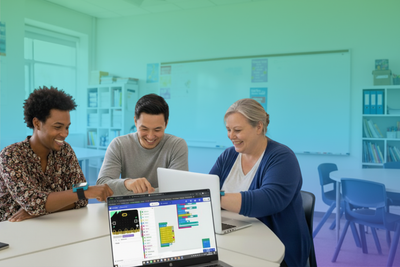
Educator Webinars
Free 45-minute training to teach AI literacy with hands-on activities.
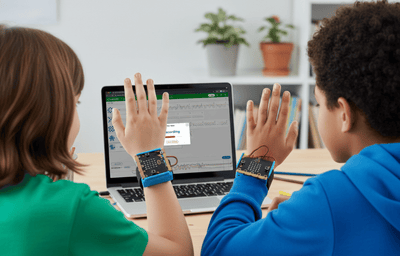
AI for Good Competition
Inspire students to use AI and micro:bit to create a positive impact.
Affordable AI Starts Here
Bring engaging hands-on AI literacy to grades 4–9 classrooms
for as little as $11 per student, when two students share a CHARGE and micro:bit.
Great for classrooms, afterschool programs, learning commons, or in makerspaces as a shared resource.
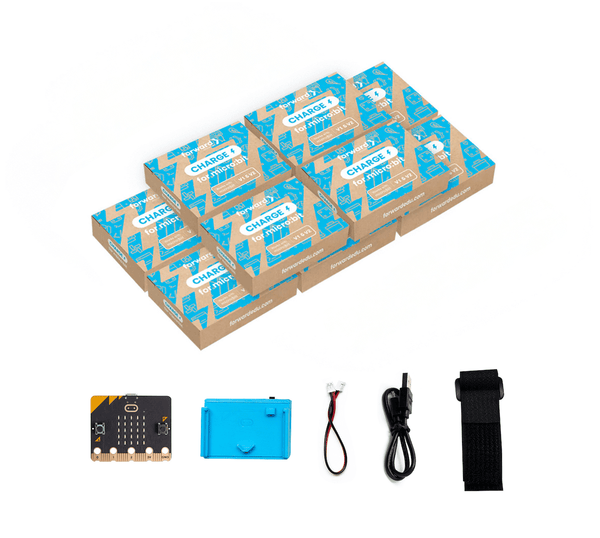
Class Pack Cost Calculator
Battery Savings
What we're working on
What's Next for Hands-on AI Learning
We’re building hardware, software, and learning content that makes AI simple, practical, and engaging.
Hands-on AI is already part of CHARGE and the Climate Action Kit. Now, we're expanding our ecosystem with custom apps to train sensors, interpret data, and code in plain-text, along with new AI video and voice modules.
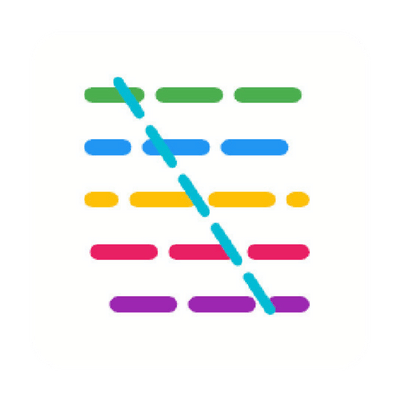
MicroSense
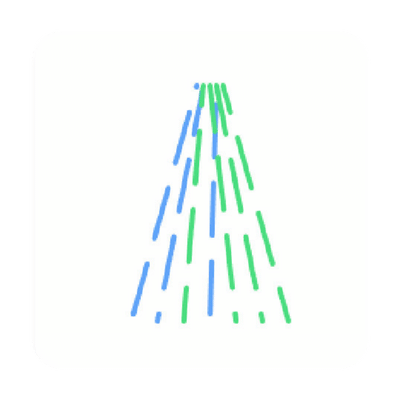
Datalog Explainer
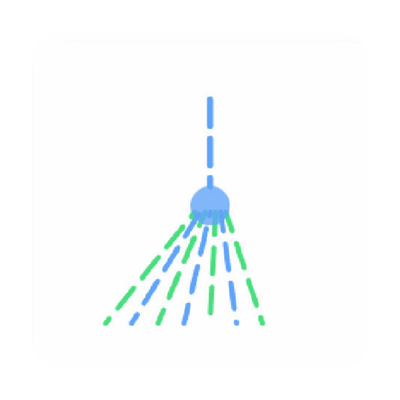
Sensor Train
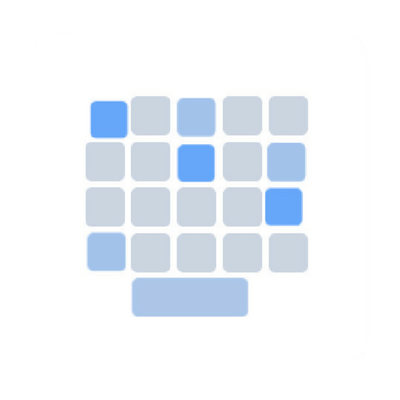
CodeFREE
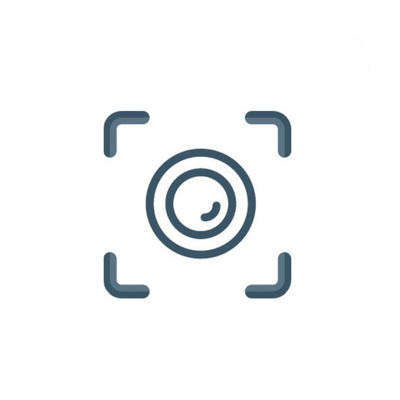
Vision Sensor
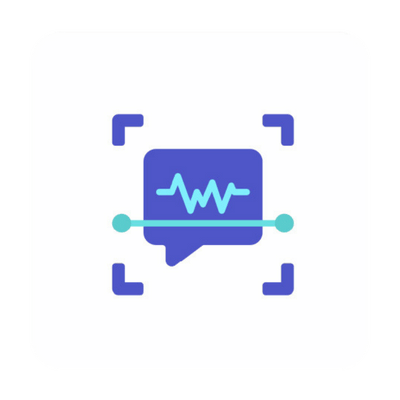
Voice Recognition

Making Kits Smarter with AI
Our plug-and-play coding and robotics kits and accessories are getting an AI upgrade with apps to train sensors, plus new smart modules that expand what’s possible.
- Existing Kits Get An Instant AI Upgrade: Train sensors on light, sound, and movement, then turn AI models into inputs, logic, and outputs for your coding projects.
- Adding New Video and Voice Sensors: Bring voice, sound, video, images, colors, and more into robotics projects as inputs and outputs.


Surfacing Data Insights with AI
Students can build a deeper understanding of the world around them with AI apps that analyze sensor data and surface meaningful insights.
- Using AI to Discover Patterns in Data: Analyze real-time or logged inputs like temperature, light, and sound with our AI Data Insights app to uncover trends and answer questions.


Coding in Plain Language
Make coding more approachable and equitable for students of all skill levels.
- Turning Words into Code: Give instructions and watch our AI Code Generator turn it into code that students can review and use.


Why Hands-on AI Matters
Artificial intelligence is reshaping every industry, including education. For many, AI still feels like a “black box” chatbot. We believe the best way to learn is hands-on.
- Learn by Doing: Train AI models using real data and see devices respond instantly.
- Observe AI Ethics in Action: Discover how representation and data quality shape outcomes.
- Apply AI for Good: Complete projects and challenges that connect skills to real community impact.

AI Funding Opportunities
The latest information and links to local and national AI funding.
Toshiba America Foundation (TAF) STEM Grants
Sixth to 12th grade teachers are invited to apply on-line for a Toshiba America Foundation grant of up to $5,000 and more than $5,000 to help bring an innovative project into their own classroom.
Purpose:
- To support teacher-designed, hands-on, engaging STEM projects in the classroom.
- To make STEM fun, accessible, real-world relevant, giving students experiences beyond purely textbook work.
Who is Funded:
- TAF offers grants to public and nonprofit private schools in the U.S. focused on STEM (science, technology, engineering, math) education.
- Teachers with innovative, project-based learning ideas are prime applicants.
What's Funded:
- Project-based STEM learning that has measurable outcomes.
- Examples: agriscience, astronomy, robotics, virtual reality, environmental science, etc., especially when tied to real-world or community issues.
Deadlines:
- Teachers of sixth-12th grade have until November 1, 2025 to submit for more than $5,000 and December 1, 2025 for less than $5,000.
How it fits the Climate Action Kit:
The Climate Action Kit is an ideal match for the Toshiba America Foundation grant because it embodies everything the program is designed to support: teacher-led, hands-on, project-based STEM learning with measurable outcomes. With the Kit, students build environmental science and renewable energy prototypes like wind turbines, smart farming systems, and hydroponics setups that connect coding, robotics, and sustainability.
Teachers applying for this grant can highlight how the Climate Action Kit:
- Makes STEM real-world relevant by engaging students in climate and environmental problem-solving.
- Encourages creativity and innovation through open-ended design challenges that move beyond textbooks.
- Delivers measurable outcomes as students code, test, and refine working prototypes that demonstrate their understanding.
- Supports multiple disciplines including agriscience, environmental science, robotics, and data analysis, which are all examples of what Toshiba specifically lists as fundable.
By applying with the Climate Action Kit and merging environmental action with hands-on technology, teachers can frame it as a compelling proposal for TAF funding.
Link: https://www.toshiba.com/taf/612.jsp
NSF Supplemental Funding Requests for K-12 AI Teams (Presidential AI Challenge via Community-Based Partnerships)
Funding up to $25,000 per team. Up to 100 multi-person teams are expected to be funded nationwide.
Purpose:
- Encourage hands-on and experiential learning in AI among K-12 students and educators.
- Expand early access to quality AI learning opportunities.
- Prepare youth for success in an AI-enabled world.
Who is Funded:
- Youth / Educator teams in K-12 who are participating in the Presidential AI Challenge through community-based partnerships.
What is Funded:
- Equipment, supplies, software related to AI challenges
- Educator or student stipends
- Travel for events, project showcases, registration/transportation fees
- Community events, mentorship or curriculum support
Deadline:
- NSF Supplemental Funding Requests are due by November 7, 2025
How it fits Training an AI Model with CHARGE
The CHARGE battery pack and machine learning apps are a natural fit for the NSF’s Presidential AI Challenge funding. These tools make hands-on, experiential AI learning simple, affordable, and accessible for K–12 youth and educators. With CHARGE powering micro:bit projects that enable students to train models, schools can design AI-driven solutions to real-world problems without expensive hardware or complex setups.
Educator teams applying for this NSF supplement can show how CHARGE and CreateAI:
- Expand early access to AI by using devices students already know, paired with affordable upgrades, to lower barriers to entry.
- Encourage active, project-based learning as students train and apply their own AI models in robotics, coding, and data projects.
- Support community impact through AI for Good challenges, like building assistive technologies, environmental monitors, or smart systems.
- Provide measurable, showcase-ready outcomes with prototypes and student-led demos that can be shared at events, exhibitions, and community forums.
With funding available for equipment, supplies, software, stipends, and travel, CHARGE positions teams to maximize the NSF’s goal: preparing students for success in an AI-enabled world while keeping projects affordable, portable, and deeply connected to community needs.
Link: https://www.nsf.gov/funding/opportunities/dcl-supplemental-funding-requests-support-k-12-artificial































